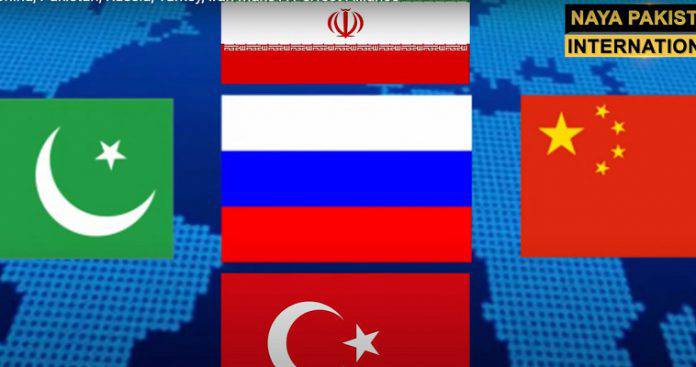Kostas Grivas: Why Germany pampers Erdogan – The Eurasian chessboard and the role of Greece
26/10/2020
In previous articles on SLpress, the author referred to Turkey’s strategic goal of becoming a regulator of developments in the Eurasian chessboard and balancing between the two major emerging global power poles. Also we referred to the possibility of wanting to form a kind of Eurasian distant relative of the old Non-Aligned Movement, in collaboration with Pakistan and some of the Turkic-speaking former Soviet Republics of Central Asia.
But the situation may be even more interesting. In particular, if this pattern does take shape, then it is very likely to significantly influence the geopolitical behavior of other countries. The first of these are other Muslim countries in Asia, such as Malaysia and Indonesia. Most importantly, however, serious effects are likely to occur, even in the “deep interior” of Europe, particularly in Germany.
The latter has traditionally turned its gaze to the east, while with the unification of the German states, after the victory of the Prussians over France in 1870, it became too strong to “fit” in Western Europe. Today, in a post-European and post-American era, it seems to be looking for a new role.
By the terms post-American and post-European era we mean that the United States is in a prolonged existential crisis leading to a lack of a structured geostrategy, at least in the short term. At the same time, the dream of a United Europe is probably just a whim and the Old Continent is rapidly transforming, again into a competitive field.
Securing a vital financial space
Germany is well aware that economic dominance is not enough to dominate intra-European competition. It needs a broader geopolitical upgrade, on which its economic power will “click”. It may be able to achieve this upgrade, turning to the vast land “sea” of Eurasia. A possible collaboration with this Turkish-led Muslim group will probably offer it this opportunity.
First of all, in this way Germany will secure a vital space for its economy, which in the future may be called upon to operate in a new environment that will not be the globalized single market, but will have a strong elements of protectionism and commercial activity will be harmonized with broader geopolitical strategies of powerful actors.
In addition, it will gain strong bargaining chips with Russia and China, with which it maintains mixed competition and cooperation relationships, especially in trade. Finally, in this way it aspires to gain increased special weight vis-a-vis France, which is its main rival in intra-European competition, although at the same time its partner in other areas. It also aspires to have strong negotiating cards against the United States.
The possibility of cooperating with the possible Muslim “third pole” in Eurasia is strengthened by the existence of the large Turkish minority inside Germany, which is a critical factor in shaping the election results and pushes to strengthen relations with Turkey.
An opportunity for Greece
As for Greece, a similar Eurasian scheme, which will function as a potential third pole in the world of the coming decades, is causing headaches for all three major planetary actors, namely China, the US, and Russia. It causes the same for minor actors, such as France and India, and for even more local actors, such as Egypt, Saudi Arabia, the United Arab Emirates, etc. Much more so if Germany in a more relaxed way partners with this entity.
The “head” of this “geopolitical snake”, which worries the strongest forces and suffocates the smaller ones, is Turkey. And the only force that can strike the head of the “snake” is Greece. That is, a potential huge geopolitical opportunity is emerging for Greece, not just to participate, but to lead an ad hoc anti-Turkish formation, not because of size, but because it is in the right place and has the right opponent against it.
It is only Greece that can inactivate it and consequently stop the construction of this intermediate geopolitical edifice. If Germany is indeed considering joining this scheme, its destruction may be the necessary first step Greece needs to begin the process of getting rid of the suffocating German embrace. To do this, however, it must move boldly, confidently and take risks.
The Eurasian Champions League!
Greece must stand tall against Turkey, not constantly retreat, and even risk an armed confrontation with it. In particular, it must discipline itself against the “tricks” and the orders it will receive from Berlin, but also possibly from Washington, which at the moment does not seem to have a structured strategy.
Of course, I understand that such views provoke the grief and ridicule of both the country’s elites and most of the public, who have adopted the notion of a small, weak, and non-existent Greece, especially vis-a-vis Germany. So, when you say that Greece can play a leading role in the huge game that is being set up today in the “Great Chessboard” of Eurasia, according to Brzezinski, it is like saying to the agents and fans of a team that thinks it is playing in the local league, that in fact is in the Champions League groups!
But that is exactly the reality. Greece has the role it has because it is in the position it is in and it has its opponents against it. Trying to hide from history is a paranoid reading of reality. On the contrary, the acceptance of the forced leading role that history imposes on Greece, is the only realistic choice.





